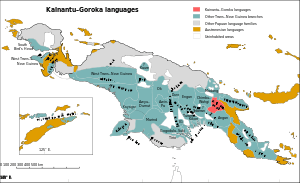Kainantu–Goroka languages
| Kainantu–Goroka | |
|---|---|
| East Highlands | |
| Geographic distribution: | highlands of Papua New Guinea |
| Linguistic classification: |
|
| Subdivisions: |
|
| Glottolog: | kain1273[1] |
|
Map: The Kainantu–Goroka languages of New Guinea
The Kainantu–Goroka languages
Other Trans–New Guinea languages
Other Papuan languages
Austronesian languages
Uninhabited | |
The Kainantu–Goroka language are a family of Papuan languages established by Arthur Capell in 1948 under the name East Highlands. They formed the core of Stephen Wurm's 1960 East New Guinea Highlands family (the precursor of Trans–New Guinea), and are one of the larger branches of Trans–New Guinea in the 2005 classification of Malcolm Ross.
Languages
The constituent Kainantu and Goroka families are clearly valid groups, and William Foley considers their TNG identity to be established. However, the internal classification is merely impressionistic.
- Goroka family
- Kainantu family
The pronouns reconstructed for proto-Kainantu–Goroka, proto-Kainantu, and proto-Goroka are as follows:
proto-Kainantu–Goroka sg pl 1 *ná *tá[za] 2 *ká[za] *tá-na- 3 *[y]á, *wá *yá[na] proto-Kainantu sg du pl 1 *né *té[ze]- *té[ze] 2 *é[ze] *[te]né- 3 *wé
proto-Goroka sg pl 1 *ná *tá[za] 2 *ká *tá-na-gaza, *tí-na-gaza 3 *[y]á *[y]á-na-gaza, *í-na-gaza
The possessive forms are:
proto-Kainantu–Goroka sg pl 1 *na-i *ta-i 2 *ka *tana-i 3 *[y]a, *wa *ya-i, *yana-i
See also
- East New Guinea Highlands languages, an expansion of Kainantu–Goroka in Wurm 1975 which was abandoned by Ross due to a lack of unifying morphological data.
References
- ↑ Nordhoff, Sebastian; Hammarström, Harald; Forkel, Robert; Haspelmath, Martin, eds. (2013). "Kainantu–Goroka". Glottolog. Leipzig: Max Planck Institute for Evolutionary Anthropology.
Bibliography
- Ross, Malcolm (2005). "Pronouns as a preliminary diagnostic for grouping Papuan languages". In Andrew Pawley, Robert Attenborough, Robin Hide, Jack Golson, eds. Papuan pasts: cultural, linguistic and biological histories of Papuan-speaking peoples. Canberra: Pacific Linguistics. pp. 15–66. ISBN 0858835622. OCLC 67292782.
